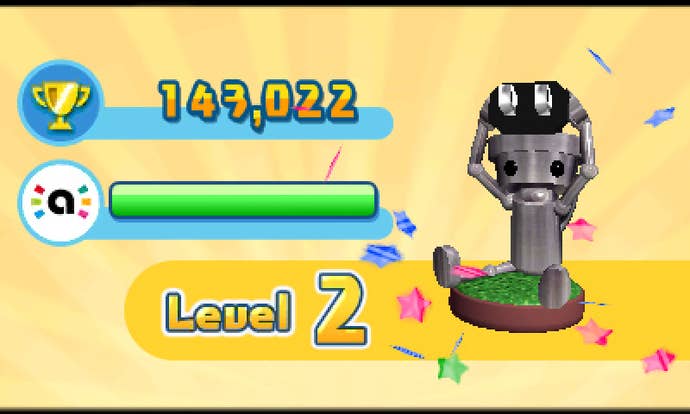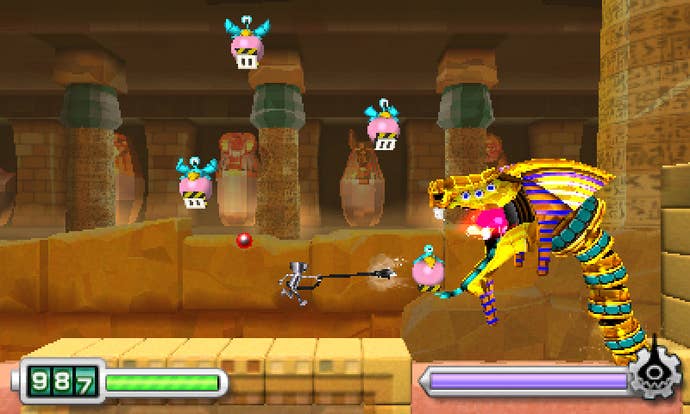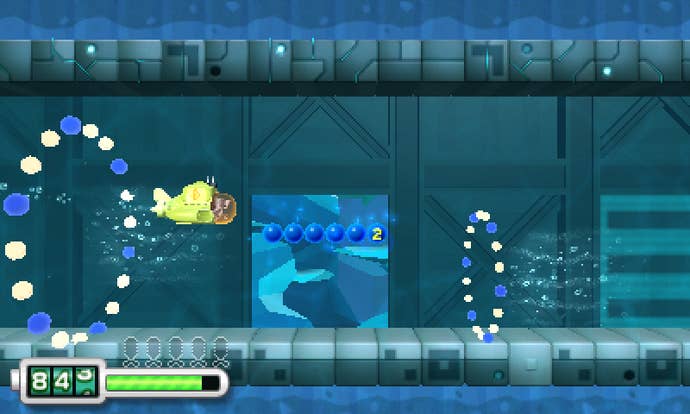Chibi-Robo: Zip Lash 3DS Review: Lashadaisical
Despite a solid premise, Chibi-Robo's latest adventure lacks the refinement it needs to become a classic.
This article first appeared on USgamer, a partner publication of VG247. Some content, such as this article, has been migrated to VG247 for posterity after USgamer's closure - but it has not been edited or further vetted by the VG247 team.
I didn't expect the Chibi-Robo series, of all innocuous things, to bring us a game so centered around the idea of consumerism. And yet, here's Zip Lash, a 3DS release in which that very concept sits front and center, permeating the game from start to finish.
Of course, as a platform action game, the element of acquisition in Zip Lash seems essentially unavoidable. As has been the case with this genre since time immemorial—i.e., since Mario first snatched up Pauline's lost accessories on his way to sending Donkey Kong plummeting to unconsciousness—it's not enough for Chibi-Robo to simply reach the end of each of the game's 40-odd stages. He also needs to accumulate as much clutter as possible along the way. That includes coins, power-ups, and even literal clutter: Assorted debris and waste that's been left strewn about the world.

Chibi-Robo, a tiny robot whose life largely revolves around picking up after slovenly humans, was basically WALL-E before WALL-E existed. Between its theme and the genre it occupies, Zip-Lash comes by its focus on material goods naturally. There's no accounting, however, for just how far it takes this concept. Besides collecting cash, litter, tinier tiny robots, and upgrades, Chibi-Robo also spends a great deal of time searching for real-world licensed food products.
This is nothing new to video games, of course; product placement happens all the time. From the functional (in-game iPods that you could load up with alternate music in Metal Gear Solid 4) to the immersion-breaking (SoBe soft drinks in Oddworld: Munch's Oddysee), it seems there's no publisher in the world who isn't above making a little extra scratch by dropping some kind of product into a game world, no matter how far removed from reality it may be. In practice, this makes perfect sense for Chibi-Robo; in a game where the hero spends his time picking up after the slobs of the world, it only follows that some of this litter would be properly branded.
No, what sets Zip Lash apart is the intensity with which it incorporates these products. It's not simply enough to have little miniature polygonal models of chips and candy in the game; gathering brand-name snack foods actually exists as its own independent quest line. Not only that, but once you complete your scavenger hunt task and bring your requisite junk food to the NPC who exists entirely to demand these products, you're treated to a long-winded description of that food product and all its attendant wonders.
The whole thing is weird and intrusive, and feels incredibly tacked-on... not to mention tacky. I'd like to think there was some clever message behind it all, some wry commentary around the fact that the snacks that are treated with such affection are barely indistinguishable from the garbage you pick up to toss into your ship's incinerator. Unfortunately, that's not the case; Zip Lash dearly lacks the self-awareness to pull off such a feat. And perhaps that should come as no surprise, either; after all, this is the first U.S. release by Nintendo to come packed alongside an exclusive Amiibo figurine. It's essentially a celebration of acquisitiveness, and there's no getting over the fact that its breathless enthusiasm for snack food from around the world lacks the slightest iota of irony.

Perhaps this seems like a lot of nothing to complain about, but taken as part of the whole Chibi-Robo: Zip Lash package, the gormless gushing about brand-name products feels like a case of badly misplaced priorities. Zip Lash has plenty of sharp ideas behind it, but they never once feel as though they gel into a cohesive whole. The game struggles to maintain a sense of bland mediocrity; as a platformer, it feels like a step back from games such as Shovel Knight and Yoshi's Woolly World. But while it may be stiff and awkward to play, it sure does offer encyclopedic knowledge of foreign candy and give you lots to do with your Amiibo. That's something, I suppose.
At the conceptual level, I should love Chibi-Robo. It basically wants to be Bionic Commando, one of my favorite games ever; the entire game is named for its core mechanic of using Chibi-Robo's power cord as a whip and grappling hook. Earnestly as it may try, however, the game lacks the refinement that should have been conferred by decades of other, better grappling platformers. The control scheme feels sluggish and clumsy compared to Bionic Commando or Ninja Five-O, and it lacks the technical precision of something like Umihara Kawase (which, coincidentally, has just made its way to Steam, and would be a better use of your money than Zip Lash).
It's the little things that bring Zip Lash down. Even something as simple as the control scheme works against the game; the developers made the odd decision to map jumping and attacking to the A and X buttons, respectively, rather than to the standard B and Y. Presumably that's because Y is reserved for winding up the special zip lash command, and there's no button remapping for players who find the default configuration incredibly awkward. It doesn't help that Chibi-Robo can't "queue up" commands if you press an action button just a frame or two too soon, unlike most other games of this ilk. He has to play out his sluggish little animations before he'll recognize commands, which can be particularly frustrating if you botch the timing on using the zip lash, a charged attack that stops the flow of action.
Nuisance design decisions like this dog Zip Lash at every turn. Stages tend to be just a little too drawn out for their own good, presumably because Chibi-Robo's cord is reset to its 12" default length at the beginning of every level; each stage needs to be long enough to allow you to collect enough upgrades to bring it to its full length of 10 feet. The need to expand the cord initially comes off as clever and interesting, as in the early mission where you encounter a puzzle that can't be completed until you acquire some extensions and return later to solve it, but after a while the process grows boring and predictable given that you have to do it every single time.

Perhaps most infuriating is the bizarre decision to force you to hit the correct space on a roulette wheel in order to advance to another stage. Each world has half a dozen stages arranged in a circle, and you can't simply zip from one to the next at will; based on your performance in hitting targets at the conclusion of a stage, you're given one to three spins on a roulette wheel that determines how many stages forward on the map you must advance. You can't cancel out of a level and return to the map until you beat the stage you land on, so if you're trying to get to a specific level and screw up the roulette wheel, you have to work your way back around the circle by playing through multiple stages in their entirety until you can score on the roulette.
It's choices like this infuriating stage select system, or auto-scrolling stages in which you're sent back to the very beginning of the level if you screw up once (even at the end of the level) that help create the impression that Chibi-Robo's designers had more enthusiasm for locking down candy licensing deals than respect for the player's time. Yes, there are replay incentives for each stage—an entire subquest revolving around rescuing lost baby aliens that can only be activated your second time through a given level—but the biggest replay incentive is in short supply: Namely, the game just isn't much fun to play. It controls sluggishly, it lacks fresh or inventive design ideas, and it's actively disrespectful to players' free time.
I mean, it's cute that I now know that there are gummy candies that resemble cars for sale in Germany or whatever, but I'd rather the time invested in putting together Zip Lash's extensive snack-hunting subquest had been put into smoothing over the flow of the platform grappling or adding a button customization setting to the options screen.
InterfaceSlightly slow controls meet with fixed, awkward button mapping and some utterly offensive design options to create a minor video game train wreck.
Lasting AppealThere are a lot of really lengthy stages in this game, all designed to be replayed. But will you want to replay them? Probably not.
SoundBright, jangly sound effects dance across perky, enthusiastic music. Fine if you have a tolerance for excess cheer.
VisualsDecent enough, though they often suffer from the bland sterility that so many 2D polygonal games on tiny screen demonstrate.
ConclusionThere's talk that Zip Lash could be the final Chibi-Robo game, and that's a shame. I'd prefer to see him go out with a bit more style than Zip Lash offers. The irony of this game focused around acquisition and collecting is that it's not really worth acquiring for your collection. Even if that Amiibo is awfully adorable.








